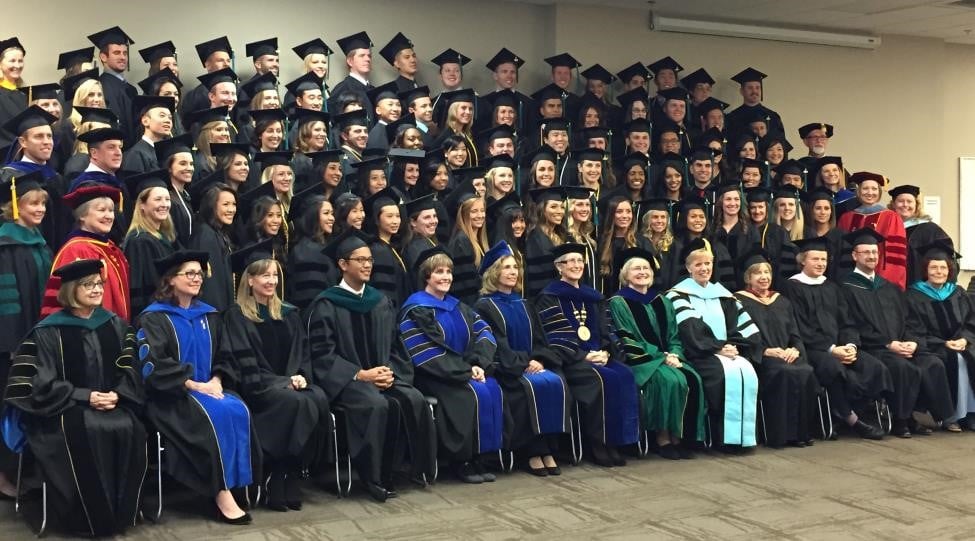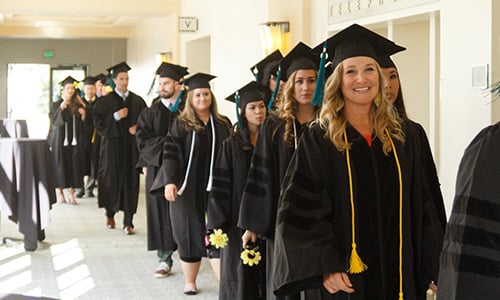


Lauren Padron, MS-SLP ’22
When Lauren Padron, MS-SLP ’22, decided to switch careers from physical therapy to speech therapy, she wanted to apply to USAHS’ Master of Science in Speech-Language Pathology (MS-SLP) program—but she was missing some of the prerequisites she needed. Fortunately, USAHS had a solution.
For students who want to earn their master’s degree in SLP but may need to brush up on one or more topics first, USHAS offers six leveling courses that serve as a pathway to the MS-SLP program. Padron, who had earned her bachelor’s degree in health and exercise science and was working as a licensed physical therapy assistant (PTA), had taken the necessary prerequisites in biology and math. But she lacked the background in communication sciences and disorders (CSD), so she needed to take five leveling courses in order to meet the admission requirements for the master’s program.
“The courses were a good review and introduction to the coursework. They gave me the time and opportunity to see if speech-language pathology was something I wanted to do.”
During her 10 years working as a PTA, Padron had worked alongside SLPs, so she had an idea of what they do. And when her young son began speech therapy, “I had a firsthand view as a parent of how speech and language therapy can help children and families,” she says.
Due to a family move to South Florida, Padron’s son had a gap in speech services that she filled by leading activities with him. “Consistency was a big plus for him,” she says. “This experience gave me a different lens, just knowing how important parent/child communication is. I wanted to help others in the same situation.” Excited about the possibilities in speech-language pathology, she decided to change careers.
“A good foundation in the basics of SLP”
Padron completed all five courses in two trimesters. She was accepted into the MS-SLP program’s Fall 2020 cohort. Now in her fourth trimester, she is doing a clinical practicum at a school and working as a student clinician in USAHS’ Pro Bono SLP Clinic. She appreciates that the MS-SLP coursework is online, since she has two young children who were learning from home during the pandemic. But she enjoys the on-campus residencies in Austin. “It’s great to be able to see everyone in person, speak to your professors in person face to face, and bond more,” she says. “Everyone enjoys the experience.”
“My opportunity to interview the program”


Catherine Mugambi, CCC-SLP ’20
While earning her bachelor’s degree in CSD online with Utah State University, Catherine Mugambi, CCC-SLP ’20, worked part-time in special education with kids who had communication disorders. After graduation, she worked as an SLPA in school, clinic, and home health settings. But she wanted to take her career to the next level with her master’s degree in speech-language pathology.
“Speech is very competitive—it’s hard to get into a master’s program,” she says. Her enrollment advisor at USAHS told her that she needed to take one leveling course—Speech Anatomy and Physiology—before she would be eligible to apply.
“This course was my opportunity to interview the master’s program and interview my future professors. I enjoyed the class, and when it was time to apply, I went in feeling confident.”
Mugambi’s first term in the master’s program was intense, as she made the shift from one leveling course to four master’s-level classes. “But there’s a sense of community, and it was a good cohort,” she says. “I had some long nights, but it was manageable.”
Her husband was earning a graduate degree in nursing administration online, and their two boys, now ages 12 and 14, were taking virtual classes during the pandemic—so the entire family was studying in their Houston home at the same time. “Our kids got to see us working hard, so that was good modeling for them,” she says. “If you want something really bad, you’re going to go for it.”
She says that the master’s program prepared her well for her career.
“Especially the hands-on residencies on the Austin campus—those were key. The professors are good advocates—they want what’s best not just for the students but also for the profession.”
She is currently working part-time in an educational setting and part-time in a medical setting. She is interested in owning her own business one day. “SLP has almost endless possibilities,” she says.
“I would highly recommend taking a leveling course,” Mugambi says. “If you’re coming in from a different degree, you can’t just walk in. If you had a bit of a break after your CSD undergrad, it’s a good refresher.”








